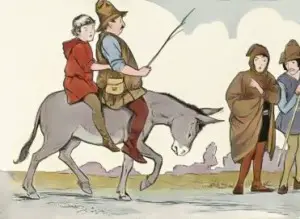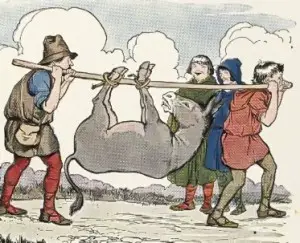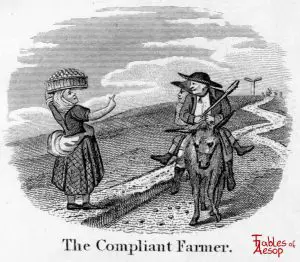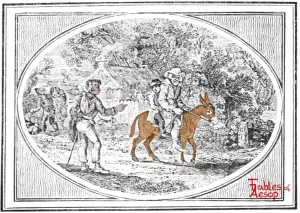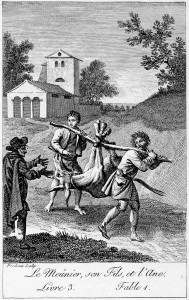A Miller and his Son had an Ass. They tried to change how they moved as they met people along the road. They lost the Ass while trying to please everyone.
You can’t please everyone.
Also see The Man, The Boy, and The Donkey.

Aesop For Children
One day, a long time ago, an old Miller and his Son were on their way to market with an Ass which they hoped to sell. They drove him very slowly, for they thought they would have a better chance to sell him if they kept him in good condition. As they walked along the highway some travelers laughed loudly at them.
“What foolishness,” cried one, “to walk when they might as well ride. The most stupid of the three is not the one you would expect it to be.”
The Miller did not like to be laughed at, so he told his son to climb up and ride.
They had gone a little farther along the road, when three merchants passed by.
“Oho, what have we here?” they cried. “Respect old age, young man! Get down, and let the old man ride.”
Though the Miller was not tired, he made the boy get down and climbed up himself to ride, just to please the Merchants.
At the next turnstile they overtook some women carrying market baskets loaded with vegetables and other things to sell.
“Look at the old fool,” exclaimed one of them. “Perched on the Ass, while that poor boy has to walk.”
The Miller felt a bit vexed, but to be agreeable he told the Boy to climb up behind him.
They had no sooner started out again than a loud shout went up from another company of people on the road.
“What a crime,” cried one, “to load up a poor dumb beast like that! They look more able to carry the poor creature, than he to carry them.”
“They must be on their way to sell the poor thing’s hide,” said another.
The Miller and his Son quickly scrambled down, and a short time later, the market place was thrown into an uproar as the two came along carrying the Donkey slung from a pole. A great crowd of people ran out to get a closer look at the strange sight.
The Ass did not dislike being carried, but so many people came up to point at him and laugh and shout, that he began to kick and bray, and then, just as they were crossing a bridge, the ropes that held him gave way, and down he tumbled into the river.
The poor Miller now set out sadly for home. By trying to please everybody, he had pleased nobody, and lost his Ass besides.
Moral
If you try to please all, you please none.

Jefferys Taylor (The Compliant Farmer)
AN honest farmer and his son
Were driving once an ass to town;
But, wishing not to tire the brute,
They would not ride but walk’d on foot.
“Well,” said a man, whom soon they met,
“I ne’er beheld such nonsense yet!
Why should ye walk? why don’t ye ride?
Pray what’s a donkey for beside?”
“Right,” said the farmer, “Son, arise,
And take our worthy friend’s advice.”
The duteous son obey’d with haste,
And soon bestrode th’unwilling beast.
Scarce had he mounted, when, behold,
Two women next began to scold.
“You lazy boy!” at once they cried,
Why don’t you let your father ride?”
“True,” said the father; “Son, get down:
I’ll ride, and you shall walk to town.”
The son dismounted honest Ned,
And let his father ride instead.
Once more they sped them on their way,
And met a party. “Come,” said they,
“Your legs are longer than your son’s;
Suppose you let him ride for once.”
“Good,” said the father; ” Son, you see
There’s room enough for you and me;
Get up behind.”—Once more the son
Bestrode the beast, and journey’d on.
Again they sped; again they met
A party not contented yet:
Said they, “Have pity on your beast.
And one of you get down at least.”
But our good farmer thought at last,
He e’en would profit by the past;
Nor change again, unless, indeed,
In one opinion all agreed.
Although opinions vary so,
‘Tis hard the right from wrong to know,
(And never would the labour cease,
Of studying every man’s caprice;)
Yet some there are in which we see
The wise and good do all agree:
Let their opinions be your own,
And let what they advise be done.

Townsend version
A miller and his son were driving their Ass to a neighboring fair to sell him. They had not gone far when they met with a troop of women collected round a well, talking and laughing. “Look there,” cried one of them, “did you ever see such fellows, to be trudging along the road on foot when they might ride?’ The old man hearing this, quickly made his son mount the Ass, and continued to walk along merrily by his side. Presently they came up to a group of old men in earnest debate. “There,” said one of them, “it proves what I was a-saying. What respect is shown to old age in these days? Do you see that idle lad riding while his old father has to walk? Get down, you young scapegrace, and let the old man rest his weary limbs.” Upon this the old man made his son dismount, and got up himself. In this manner they had not proceeded far when they met a company of women and children: “Why, you lazy old fellow,” cried several tongues at once, “how can you ride upon the beast, while that poor little lad there can hardly keep pace by the side of you?’ The good-natured Miller immediately took up his son behind him. They had now almost reached the town. “Pray, honest friend,” said a citizen, “is that Ass your own?’ “Yes,” replied the old man. “O, one would not have thought so,” said the other, “by the way you load him. Why, you two fellows are better able to carry the poor beast than he you.” “Anything to please you,” said the old man; “we can but try.” So, alighting with his son, they tied the legs of the Ass together and with the help of a pole endeavored to carry him on their shoulders over a bridge near the entrance to the town. This entertaining sight brought the people in crowds to laugh at it, till the Ass, not liking the noise nor the strange handling that he was subject to, broke the cords that bound him and, tumbling off the pole, fell into the river. Upon this, the old man, vexed and ashamed, made the best of his way home again, convinced that by endeavoring to please everybody he had pleased nobody, and lost his Ass in the bargain.

Thomas Bewick (The Miller, His Son, and Their Ass)
A Miller and his Son were taking their Ass to market to sell him, and that he might get thither in good condition, they drove him gently before them. They had not proceeded far before they met a company of travellers: Sure, say they, you are mighty careful of your Ass; one of you might as well get up and ride, as suffer him to walk on at his ease, while you trudge after on foot. In compliance with this advice, the Old Man set his Son upon the beast. And now, they had scarcely advanced a quarter of a mile further, before they met another company. You idle young rogue, said one, why dont you get down, and let your poor father ride? Upon this, the Old Man made his Son dismount, and got up himself. While they were marching in this manner, a third company began to insult the father. You hard-hearted wretch, say they, how can you suffer that poor lad to wade through the dirt, while you, like an alderman, ride at your ease? The good-natured Miller stood corrected, and immediately took his Son up behind him. And now the next man they met exclaimed, with more vehemence and indignation than all the rest, Was there ever such a couple of lazy loobies! to overload in so unconscionable a manner, a poor dumb creature, who is far less able to carry you, than you are to carry him! The complying Old Man would have been half inclined to make the trial, had not experience by this time sufficiently convinced him, that there cannot be a more fruitless attempt, than to endeavour to please all mankind.
APPLICATION.
It is better to pursue the dictates of one’s own reason, than attempt to please every body; for to do this is next to impossible. Therefore we ought to decide according to the best of our judgment, and correct our mistakes from our own experience. Wise men are instructed by reason; men of less understanding by experience; the most ignorant by necessity; and beasts by instinct. When a man so neglects himself, as not to make a just use of his reason and his mental powers, in combating with prejudice and folly, as well as the caprice of others, he will ever be led on in a maze of error, wavering and embarrassed about pursuing this or that path, until between them he is lost in a labyrinth, from which he will never be able to extricate himself as long as he lives.

de La Fontaine (Le Meunier, son Fils, et l’Ane)
L’invention des arts étant un droit d’aînesse,
Nous devons l’apologue à l’ancienne. Grèce:
Mais ce champ ne se peut tellement moissonner
Que les derniers venus n’y trouvent à glaner.
La feinte est un pays plein de terres désertes;
Tous les jours nos auteurs y font des découvertes.
Je t’en veux dire un trait assez bien inventé:
Autrefois à Racan Malherbe l’a conté.
Ces deux rivaux d’Horace, héritiers de sa lyre,
Disciples d’Apollon, nos maîtres, pour mieux dire,
Se rencontrant un jour tout seuls et sans témoins
(Comme ils se confioient leurs pensers et leurs soins),
Racan commence ainsi: Dites-moi, je vous prie,
Vous qui devez savoir les choses de la vie,
Qui par tous ses degrés avez déjà passé,
Et que rien ne doit fuir en cet âge avancé,
A quoi me résoudrai-je? Il est temps que j’y pense.
Vous connoissez mon bien, mon talent, ma naissance:
Dois-je dans la province établir mon séjour?
Prendre emploi dans l’armée, ou bien charge à la cour?
Tout au monde est mêlé d’amertume et de charmes:
La guerre a ses douceurs, l’hymen a ses alarmes.
Si je suivois mon goût, je saurois où buter;
Mais j’ai les miens, la cour, le peuple, à contenter,
Malherbe là-dessus: Contenter tout le monde!
Ecoutez ce récit avant que je réponde.
J’ai lu dans quelque endroit qu’un meunier et son fils,
L’un vieillard, l’autre enfant, non pas des plus petits,
Mais garçon de quinze ans, si j’ai bonne mémoire,
Alloient vendre leur âne, un certain jour de foire.
Afin qu’il fût plus frais et de meilleur débit,
On lui lia les pieds , on vous le suspendit;
Puis cet homme et son fils le portent comme un lustre.
Pauvres gens! idiots! couple ignorant et rustre!
Le premier qui les vit de rire s’éclata:
Quelle farce, dit-il, vont jouer ces gens-là?
Le plus âne des trois n’est pas celui qu’on pense,
Le meunier, à ces mots, connoît son ignorance;
Il met sur pieds sa bête, et la fait détaler.
L’âne, qui goûtoit fort l’autre façon d’aller,
Se plaint en son patois. Le meunier n’en a cure;
Il fait monter son fils, il suit: et, d’aventure,
Passent trois bons marchands. Cet objet leur déplut.
Le plus vieux au garçon s’écria tant qu’il put:
Oh là! oh! descendez, que Ton ne vous le dise,
Jeune homme, qui menez laquais à barbe grise!
C’étoit à vous de suivre, au vieillard de monter.
Messieurs, dit le meunier, il vous faut contenter.
L’enfant met pied à terre, et puis le vieillard monte;
Quand trois filles passant, l’une dit: C’est grand honle
Qu il faille voir ainsi clocher ce jeune fils,
Tandis que ce nigaud, comme un évêque assis,
Fait le veau sur son âne , et pense être bien sage.
Il n’est, dit le meunier, plus de veaux à mon âge:
Passez votre chemin, la fille, et m’en croyez.
Après maints quolibets coup sur coup renvoyés,
L’homme crut avoir tort, et mit son fils en croupe.
Au bout de trente pas, une troisième troupe
Trouve encore à gloser. L’un dit: Ces gens sont fous!
Le baudet n’en peut plus, il mourra sous leurs coups.
Hé quoi! charger ainsi cette pauvre bourrique!
N’ont-ils point de pitié de leur vieux domestique?
Sans doute qu’à la foire ils vont vendre sa peau.
Parbleu! dit le meunier, est bien fou du cerveau
Qui prétend contenter tout le monde et son père.
Essayons toutefois si par quelque manière
Nous en viendrons à bout. Ils descendent tous deux:
L’âne se prélassant marche seul devant eux.
Un quidam les rencontre, et dit: Est-ce la mode
Que baudet aille à l’aise, et meunier s’incommode?
Qui de l’âne ou du maître est fait pour se lasser?
Je conseille à ces gens de le faire enchâsser.
Ils usent leurs souliers, et conservent leur âne!
Nicolas, au rebours: car, quand il va voir Jeanne,
Il monte sur sa bête; et la chanson le dit.
Beau trio de baudets! Le meunier repartit:
Je suis âne, il est vrai, j’en conviens, je l’avoue;
Mais que dorénavant on me blâme, on me loue,
Qu’on dise quelque chose, ou qu’on ne dise rien,
J’en veux faire à ma tête. Il le fit, et fit bien.
Quant à vous, suivez Mars, ou l’Amour, ou le prince;
Allez, venez, courez; demeurez en province;
Prenez femme, abbaye, emploi, gouvernement:
Les gens en parleront, n’en doutez nullement.
Perry #721
